- Home
- Brand, Max
Silvertip's Roundup Page 3
Silvertip's Roundup Read online
Page 3
Because it would have meant this denial of all value to his years of life, his years of prison and reform school, Taxi cast the thought over his shoulder. Finally, what he could remember best about Silver was the pale glimmer of his eyes and the soundless pressure of his step on the floor. This memory assured him that Silver was, like himself, a beast of prey. The memory comforted him.
“A big smart mug putting something over on me, is all,” said Taxi to himself.
He opened his suitcase and put some clothes into the bureau drawers. That suitcase was packed with exquisite precision and neatness. It was always put up the same way. In the dark, his hands could go instantly to anything in it.
Now he opened a cunningly concealed false top and took out a small burglar’s kit. The tools were fragile to the eye, delicate, but they were of a surprising strength. Steel tubing has almost the strength of steel bars — that was one explanation of its power. And the metal itself was of the most exquisite temper.
The manufacturer of those goods put them into the hands of only a few famous and expert criminals in various parts of the world. Each set cost a small fortune; and that manufacturer equipped his favored men with the means of taking several millions of dollars out of circulation every year. The bits of his drills cut through armor-plate steel as though it were butter, and his picklock set was as supple as sword blades and as strong as hope.
All the larger tools were jointed so that they could be taken apart. Taxi was taking them apart, jointing them again, with absent movements of his supple hands, as he worked over the set. He loved every bit of it. It was like an extension of his own flesh. He had nerves in the tips of the picklocks. He had nerves in the heads of the drills. The little flashlight, hardly larger than a fountain pen but capable of throwing a sharply concentrated light for hours, was to Taxi as part of his thinking brain, its sword slash through the dark had opened for him the way through so many familiar dangers. It was his fourth set; the police had grabbed three others; and this fourth set was a little smaller, lighter, stronger than any other he had ever possessed.
He began to put away the tools. They fitted into odd places. Small mouths opened in the seams of his clothes, and into them lengths were slipped. The heels of his shoes screwed off, revealing little hollows into which various bits were put. In a moment his set was out of sight, but when he shook himself, nothing jingled. There was hardly a thing to be felt by the touch of any but the most cunning hand and the forewarned brain. And yet there were few banks in the world that would have dared to turn him loose against their thickest sets of bars and locks for half an hour undisturbed.
He felt better when he had the tools on his person. He always felt better when they were in his clothes. He was complete. Walls and locks could not hold him, now.
The room was darkening as he finished. He went to the window and saw through the dusk the strange sight of Silver playing with the stallion a sort of wild game of hide and seek in the field behind the house, sloping off toward the brook. Silver was dodging through the brush; the horse like a beast of prey was after him. It was an exciting pursuit. They were both cats, one on two legs and one on four.
No matter how the man dodged on the ground like a bat through the air, he was overtaken suddenly. The great horse reared. A cruel smile came on the lips of Taxi as he watched. And then — by magic the man was on the back of the horse, and the stallion was sweeping away with great, rejoicing strides that lifted it from the ground like the beat of wings.
Taxi kept on smiling. The cruelty was gone from his face.
“There’s something in that bird,” he said to himself. “Maybe — ”
He shut the rest of that supposition out of his mind and went out to find supper. He could eat in the boarding house, of course, but the smell of cookery in the hall was not to his taste, which was always a little finicky. So he went up through the barren, open flats of the town to find a restaurant.
A boy with bare legs and trousers ragged about the knees began to walk a block behind him, turned when he turned, and went past the lunch counter which Taxi stopped at.
Even a boy can shadow a man, and Taxi knew that he had been followed and spotted down. But that was all right. It made him feel at home. It gave him an appetite for the food which he ordered. It kept him smiling down at his plate while, with uncounted side glances, he made himself aware of all that passed on the sidewalk in front of the big glass window, and every opening of the back door. At no moment was he more than a tenth of a second away from readiness to whip out his guns. He ate with his left hand, entirely, an art which he had learned and always practiced — because one never can tell.
One thing amused and entertained him and that was the increasing possibilities which he found in Horseshoe Flat. It looked like nothing but a naked junk heap to the casual eye, but there was life in the heap. There was life that had a poison tooth, perhaps.
After his supper, he wanted to find Charlie Larue who, according to fact, had killed Joe Feeley and who, it appeared, was under the protection of the gang of Barry Christian.
He could remember more about Barry Christian now. Barry Christian was one of those Western master minds of the criminal world who find their way even onto the front pages of Eastern journals. Barry Christian, he could now remember, was a fellow who had stood at the top of his profession in the West and whose capture had caused a stir only less than his escape from prison.
Well, it seemed to Taxi in a sense a pitiful thing that he and Barry Christian could not be useful to one another, in place of being at swords’ points because Taxi had to kill a member of the gang. What was the life of an unknown man, a Charlie Larue, compared to the benefits which two master crooks could confer upon one another?
He was thinking of this when he paid his bill. There were two sections of the mind in Taxi. With one section he could observe everything that happened near by. With the other section he could carry on his own reflections and observations. The separation of the faculties had cost him much effort and training. But then he had had ten years in which he could devote himself to the training of faculties — ten years of graduate and postgraduate work in reform schools and prisons where the active mind can learn so much.
He knew half a dozen tapping codes. He knew three or four sign languages in which he could talk almost as rapidly as he could by word of mouth. He had evolved a system of gymnastics which worked every muscle of the body, so that he could keep fit even when loaded with chains in “solitary.” But above all he had trained his mind to be an instrument supple, dexterous, and strong. He used to feel that his wits matched his burglar kit, and his burglar kit matched his wits.
Taxi next stopped at a clothing store and selected a wide-brimmed Stetson and a pair of boots. He had felt his own hat inadequate as a shield from the power of the Western sun, and, also, its very insignificance had seemed to make him conspicuous. For the men he saw, whatever their clothes might be, all wore hats of considerable dimensions. As for the boots, he knew that he would have some riding to do and that he would need them.
He then went up the street until, behind the flare of a gasoline street lamp, he observed the big painted sign, “Round-up Bar.”
That was where Joe Feeley had been shot to death casually in this cheerful little town of Horseshoe Flat. Perhaps that same town would be just as cheerful when it wakened one morning and discovered Charlie Larue, in his turn, had died of self-defense!
He pushed open the swing doors. With his first half step through the opening he saw everything. That was one thing almost above all else that he had trained his eye to do — to glance at the wall of a cell and be able to turn away and give the sum of the number of stones in that wall. To saunter by a shop window and state, afterward, every article that was in it. With two glances, he would be able to give a very fair résumé of the chief exhibits even in the crowded windows of a pawnbroker’s shop.
So, with his first half step through the swing doors, he saw everything worth noting and a lot th
at didn’t matter. The saloon was one big room, half-divided by an open partition into a front and a back room. In the front room there was no one. In the back room two men were playing cards by a dim spot of lamplight. In that first half step, he saw both the sawdust on the floor, the places where the feet of the players had swept the floor naked, and also the nature of the game. They were playing seven-up.
He saw the bartender, too, with a fat paunch which he countered in weight by leaning so as to put a sway in his back. The man had pouched, weary eyes. He was one of those men who remain a “good fellow” until fifty and then suddenly die. A cold turns into pneumonia. Any way you take it, you can’t beat the game in the long run.
That was what Larrigan had said to Taxi. “Salt Creek for you, kid. You like to see ‘em drop. You like it too damn well.”
Taxi always smiled when he thought of Larrigan, but his smile was half in earnest, too.
He went up to the bar and nodded to the bartender and asked for a beer. It was bad beer. It was thin and not bitter enough, and there was no head on it. But Taxi never made complaints in barrooms. He went off to a table and sipped his beer and smoked cigarettes.
He thought of a way of amusing himself. He went back to the bar and asked the bartender to show him how to roll a cigarette. The barman grinned, got a little sack of tobacco with a stiff paper label on it, and rolled a cigarette. His fingers moved like a flash. He held the thin tissue of the wheatstraw paper as a hollow trough. He sifted the yellow dust of tobacco into it. He closed the trough, getting one lip of the paper under the other. With a twist, he rolled the cigarette hard, clamped one end of the paper tube flat, and put the other end in his mouth. He lighted it and smiled wearily at Taxi through the smoke.
“Can you manage that, kid?” he asked.
Back East, nobody called Taxi “kid.” Somehow they knew better. He said he would try the trick, and at the first attempt he managed it, very slowly. The barman was impressed. The second time, after that one rehearsal, Taxi twisted up that cigarette faster than ever that barman had made one in all his days. He was amazed, and then he laughed.
“Been kidding me a little, eh?”
Taxi went back to his chair. It was always a pleasure to learn something new to occupy his fingers. Now, with the sack of tobacco and the package of wheatstraw papers, he could amuse himself, seeing how thin and hard he could roll the cigarette, or how big and firm. He smoked only a few whiffs of each cigarette; the tobacco tasted thin, and sweet, and sharp. He liked it.
Then two more men came in. One of them was a squat, waddling figure. He looked heavy with fat, at first, but afterward he was seen to be weighted down with superfluous strength. He could not keep his arms close to his sides. The bulging muscles made the arms swing wide and clear. The great hands came far down toward the knees. The other fellow was middling in height. He had a sour, sallow complexion, a tinge of red in his nose, a bright, hard eye.
“You buy this round, Larue,” said the short man.
V
The Plant
TAXI knew everything suddenly. He knew as well as if he had opened doors in the foreheads of these men and read their minds. The two fellows in the back room stopped playing their game and went up to the bar to get a drink. They should not have done that — not if they wished to make their bluff appear good. It seemed to Taxi too patent that the thing was a plant.
The boy had trailed him. These two had entered, one of them naming the man Taxi was after. And it was apparent that the people in Horseshoe Flat knew perfectly well that he was after Larue. Even the girl at the boarding house had seemed to divine it. She, no doubt, had quickly passed the word along. Or Silver had spoken. And the conversation which he had overheard between Silver and the girl — why, that was simply another part of the big plant, purposely spoken so that he might listen in to things that were untrue.
The whole picture flashed clear and true before the eyes of Taxi. And he liked it.
They had brains, these Westerners, and so did he. Wit for wit, he felt that he could match them. Only the matter of numbers was not so cheerful. Four to one. That was a heavy count. Perhaps the bartender made five.
Still, a pair of automatics can spill lead fast when an ambidexterous man is using them. The thing to do was to sit tight and drink beer — with the left hand. The bartender was setting out the drinks. He took four glasses and without moving a step, he spun them up and down the bar. Each one stopped and rocked to a standstill near one of the drinkers. Then he took out two whisky bottles and sent them spinning in the same fashion so that they found their proper halting places.
The men poured out drinks — stiff drinks.
Larue said: “Water your face, Pudge.”
That was the bartender. He took half a finger in the bottom of a glass and made a face over it before it passed his lips. He stuck out his lower lip, ready to receive the liquor in his mouth.
“Here’s in everybody’s eyes,” said Larue. “Here’s to all good guys and to hell with sneaking bums and foreign hoboes!”
That was for Taxi. His pale eyes smiled behind the dark hedge of the lashes.
“Here!” said the other four, and they drank.
One of the two fellows who had been playing seven-up called for another round. All four swung into new position, waiting. The two end men, Larue and a fellow with black, glistening mustaches dripping from the corners of his mouth, rested their elbows on the bar. The other two stepped back and dropped the tips of their fingers on the bar. This made a hollow semicircle, fit for conversation.
They would talk about Taxi. He knew it. They were spoiling for trouble.
Good sense told him to get out of the place, but instinct told him that if he tried to withdraw, he would get bullets through the back. It was a tight fit. He was not afraid, he was simply stimulated to the dancing point, so that his feet would hardly keep still. It was always that way before a fight. He never expected to be killed. He had been shot so many times, however, that at the thought of guns exploding all his old wounds ached.
There was a spot on the back of his neck that started throbbing as though an iron finger were pressing there to find the life. That was where Nick Francolini had shot him the time he was left for dead — in the waters of the East River. That had cost him four months and a long hospital bill, but a little later Nick had had quite a surprise. He had looked more surprised than dead, as a matter of fact, as he lay on his back in his swell apartment with the thick Persian rug getting all soggy with blood. A girl had been screaming, all the while, in a corner of the room. The brain of Taxi began to ache a little as the memory of her screams beat into it again.
He was not afraid of dying. But it would be painful. All the thugs out this way, he knew, carried .45-caliber Colts, and soft-nosed bullets tear out your insides. They knock you down and tear hell out of you.
“Here’s to you, Scotty,” they were saying to the man with the black mustache.
“Here’s to all good guys,” said “Scotty” slowly, “and to hell with rotten punks!”
He shifted his glance and found the face of Taxi with his eyes. Taxi sipped his beer.
Words don’t hurt, but Taxi had a certain code. He felt it was foolish. He knew it was foolish. But even from a cop he never took more than a certain amount. Words don’t hurt you, but he was queer in that respect. After a couple of verbal socks, he wanted to kill the other fellow. It was just a little peculiarity of his. It made him “go crazy” just the way he went after Paddy had clouted him on the chin about six times in a row. One more remark like this and he would have to start something.
“Here’s to Babe and all other good guys,” said Larue. He slapped the squat, mighty gorilla of a man on the shoulder, and the gorilla turned its brutal face and grinned.
“Here’s how,” said “Babe.”
“I’ll buy one,” said the second man from the card table. He had nervous hands that were always wandering over his face or rubbing a perpetual chill out of his arms. He was thin,
his hair had no color, and his eyes were as pale as straw. In a horrible, dead-faced way he was handsome. He kept smiling. His mouth was as nervous and jerky as his hands. Taxi knew all about him at the first glance. That fellow was bad news.
“We ain’t in any rush, Pokey,” said Larue. “Take it easy. What’s the use getting boiled on the stuff that Pudge hands out in this dump? Why don’t you get some decent booze in here, Pudge?”
“What’s the use?” said “Pudge,” smiling. “The real men don’t mind much, and the other kind drink beer.”
That was for Taxi again.
He smiled at his beer and straightened in his chair a little, slowly. He knew that he was going to start something. He knew that he would continue this slow motion of his body until he was standing on his feet, saying things. He was surprised and rather awed by his own knowledge of himself. Sometimes it was like that. A will inside of him took charge and carried him along, and he could only stand by and watch where it carried him.
“I’m goin’ to buy a drink,” the man called “Pokey” was saying. “I gotta buy a drink because I feel a drink comin’ over me. Fill ‘em up.”
“I’m not going to have another for a minute.”
“I don’t care when you have it, but fill them glasses!” cried Pokey. The last three words were a yell. He stood there gripping the edge of the bar and looking with rapid movements of his head from one to the other of them. His nostrils had flared out so that the light glinted pink through the translucent flesh. Taxi knew all about Pokey, but it made him a little sick. He was bad business, Pokey was.
The others looked steadily at him; they glanced at one another; they filled their glasses.

 Alcatraz
Alcatraz the Long, Long Trail (1923)
the Long, Long Trail (1923)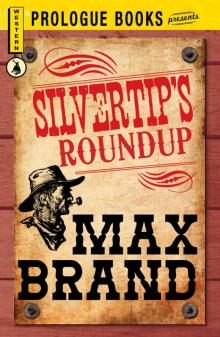 Silvertip's Roundup
Silvertip's Roundup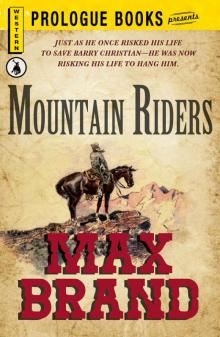 Mountain Riders
Mountain Riders Silvertip (1942)
Silvertip (1942)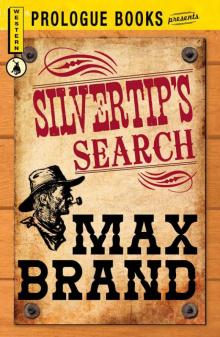 Silvertip's Search
Silvertip's Search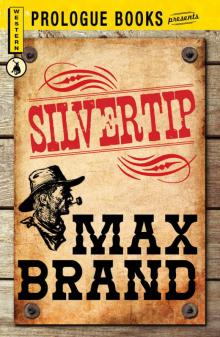 Silvertip
Silvertip Bull Hunter
Bull Hunter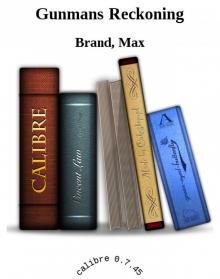 Gunmans Reckoning
Gunmans Reckoning The Seventh Man
The Seventh Man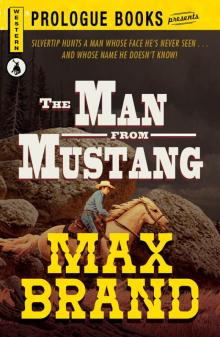 Man From Mustang
Man From Mustang Riders of the Silences
Riders of the Silences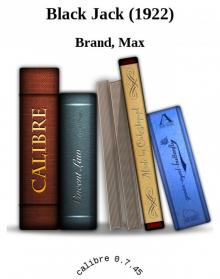 Black Jack (1922)
Black Jack (1922) Way of the Lawless
Way of the Lawless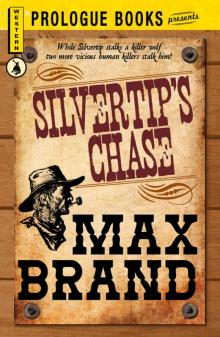 Silvertip's Chase
Silvertip's Chase Trailin
Trailin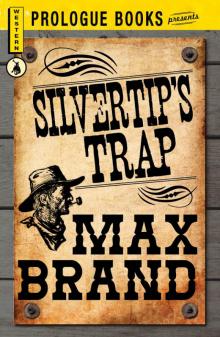 Silvertip's Trap
Silvertip's Trap Ronicky Doone (1921)
Ronicky Doone (1921) The Night Horseman
The Night Horseman the Garden Of Eden (1963)
the Garden Of Eden (1963)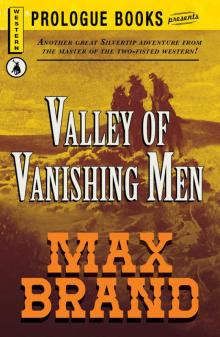 Valley of the Vanishing Men
Valley of the Vanishing Men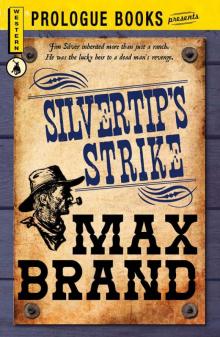 Silvertip's Strike
Silvertip's Strike Black Jack
Black Jack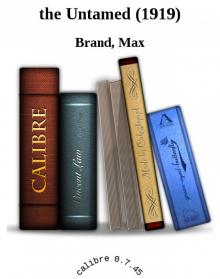 the Untamed (1919)
the Untamed (1919) Way Of the Lawless (1921)
Way Of the Lawless (1921) The Untamed
The Untamed